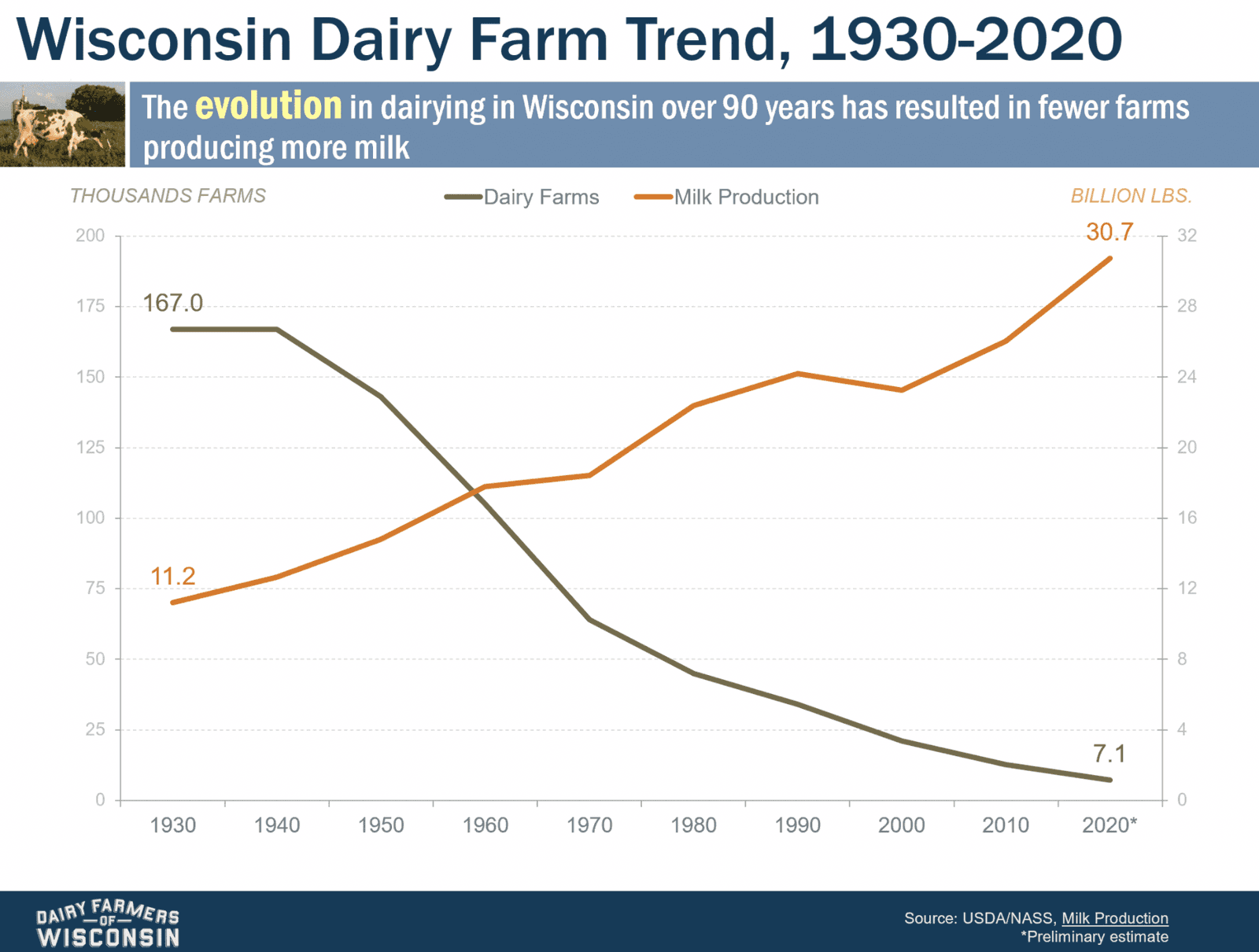I grew up on a dairy farm.
Some people might see this through the lens of some beautiful romantic nostalgia full of red barns and happy pastures while others see it has satan's helpers destroying the planet and indoctrinating sentient beings into a life of slavery.
Some people are weird.
No matter what you think about the future of dairy or any business though the fact remains that your business gets to grow from the margins you keep.
There are many ways to get margin.
Some are controversial, but controversy is zeitgeist and zeitgeists change.
Definitely one of the most controversial in agriculture today is scale.
Of course we give zero fucks about scale when it comes to our iPhone and our pickup truck but here we are. Humans are romantic about different things at different times. Deal with it.
Scale puts you in a much better position to compete on price. The prevailing wind of food competition through the ages. "Get big or get out" is a very common and pragmatic way of seeing your place inside a competitive landscape with a known tendency to lean on price competition, non specialization, and a convergence on large.

And still people write article every year about how many farms where lost.. Big surprise.Scale has some "race to the bottom" characteristics but it puts you in a pretty good place as an organization to apply leverage on inputs and outputs and perhaps eventually have a regional oligopoly on supply for a product with long term demand. Biggest risk then is government, cultural revolution, or an inability to raise happy children and/or do appropriate estate planning.
Scale also gives you "fuck you" money to try and specialize if you are wise and want to.
After scale there is brand.
Some brand is abstract some very intact.
Organic is a very abstract brand. It's more of a stamp of approval or a star on a report card than it is a real brand in my opinion. The people who made it, adopted it, packaged it, marketed it etc. did an amazing thing nonetheless.
Getting a marketing effort like it off the ground and having it coordinated with the government made a good number of people a lot of money for a time. Consumers where happy too! ( if not slightly mislead. )
Part of why it is abstract though is the lack of control you have over it as a business. If you are garnering higher margins for your product because you are part of an organic supply chain that markets its product with some other name on the packaging you are receiving pass through margin capture from someone else's brand that is bolstered by current public perception of organic.
Another part is an inability for you to manage scarcity. Farmers don't think about it much. We have a pretty ingrained "make more milk" culture.
The thing is many brands have destroyed their margin capture by becoming non-scarce. Scarce goods, with demand, have some luxury margin imbued upon them. Organic, on the other hand, is rapidly becoming non-scarce and no longer a safe home for margin capture because of it.
People who where wise and had "fuck you money" from existing scale have came in a captured this margin and are riding it to the bottom. Wise for them and wise for you to be wary.
Lastly I will add that over time, in organic and other abstract brands that exist into the future, as you get diluted on the selling price side you will also be getting extracted on the inputs side.
If you are not an operator of considerable scale your input providers will almost always undoubtably be much larger than you. Over time, if they are successful and grow, they will continue to "punch up" and try and succeed to extract more margin from your operation as they too have gone upstream to capture higher margins selling specialized goods that fit into the needs of your specialized supply chain. For businesses that succeed, growing margin capture, and going upstream, is almost always the game.
This is literally how they grow.
If you're unfamiliar with this phenomena you should read "The Innovators Dilemma."
Abstract brands don't have the necessary skin in the game to be durable over time.
"All non-trivial abstractions, to some degree, are leaky." - Joel Spolsky
If you want to play in the land of margin capture via abstract brands you resolve your future to being on a hamster wheel of adopting the next big thing and hoping it plays out for long enough to make the necessary investments to participate.
So how do we get around this?
We tell stories.
The story you tell is the margin you keep.
— carllippert (@carllippert) February 26, 2021
That company that is packaging and distributing your organic milk for you?
They have a brand. It might not be a good one but they have one.
A brand is just a story. One communicated to the customer with pretty pixels, flowery language, and perhaps, wildly, even real and tangible values.
Because the value created is just a story, hopefully backed by reality, they own it. It is a margin capture device they can bank on as long as they continue to execute. If organic goes the way of the Titanic, even if they used that stamp to bolster their brand, they can drop the organic label any day.
Their production may require special things but no specialized input provider competition will be created solely to extract value from their brand. They are a market of one.
If they do well and decide to scale they have full control over navigating scarcity. They can plaster their name on everything or decide to keep it narrow and focused.
The story you tell is the margin you keep.
Practical thoughts
Doing this is fucking hard. One great reason to go participate in an abstract brand like organic is you get synthetic exposer to a higher value brand without having to change anything about your organizations main core competencies.
You don't need to learn to story tell. You don't need to find "product market fit". You don't need to find an entirely different part of the supply chain to help you maintain your skin in the game by packaging/processing for you or seek the investment/debt to build in house processing. All hard af.
One way we can make a better future for more businesses to run this strategy is the "AWS of Food". Essentially, AWS or Amazon Web Services is the origin of what we now call "the cloud". It drastically reduced the barriers to entry for people building technology to try new things, without permission, very cheaply. Amazon needed flexible internal tech infrastructure to build their business and they externalized it as a service. 💰
What needs to be built is infrastructure that can be hired as a service, to reduce barriers to entry for food product producers, that has low switching costs. Entirely different types of organizations that can either take your raw goods or source them, a/b test brands in new markets, build, manage, and maintain brands as a service, manufacture/process/distribute, maintain distribution partnerships etc. Sharing in the upside via stock or ISA (Income Share Agreements) type structures could build a win/win relationship for providers in this category without rebuilding "will pop" incentive structures of old.
I applaud all the friends I have who are attempting to go D2C with there agriculture products. They are running this strategy. They get it.
But I do have concerns.
If your only brand is "local" I think you are going to have a tough time. If you are competing directly without any product innovation by selling the same cut of meat you are probably going to have a tough time.
Running this strategy can for sure unlock margin potential for you as an operator and is worth doing. But as soon as possible I would try to innovate on product. This comes with risk but with great reward. This is the baby version of "if you have fuck you money and are willing it would be wise to go upmarket". This will get easier if/when better infrastructure exists for a more decentralized food economy.
To try and help create the environment where this is easier for you it may be a great option to build a coop or resource sharing structure with other regional D2C ag co's. Sharing a marketing person, sharing a regional route refer truck, cobranding and bundling, building processing are all things that could be highly beneficial.
I do however think that one of the worst playbooks that is being played is the "start with on farm processing" model.
Way too much risk for the reward.
The idea that you are going to burden yourself with 30 years of debt to build a facility to create a product you don't know if you or your customer enjoy making/consuming seems crazy. It may seem like efficiency to do this, a model we are used to running, but it is extremely inefficient given that you may be pointed in the wrong direction or one that could be deemed uninteresting months after production starts.
Yes your neighbors like cheese but don't fool yourself that a market will just appear. Building a marketing skillset and a white-labeling / reselling other peoples goods is likely a better starter strategy currently. If you successfully build a pipe ( customers ), you can fill it with your cheese later.
If you enjoy my style subscribe.
Me taking you from reader to email list is my personal version of going upmarket and having greater control over my future. 🚀
